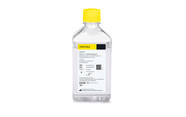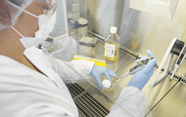Easy Film to Swallow, Hard Act to Follow?
Drug delivery to the esophagus has been underwhelming and overlooked for too long – but now a new device is going for the throat

Isabelle Racamier, CEO of EsoCap
Isabelle Racamier, CEO of EsoCap, a Swiss biotech dedicated to improving the lives of patients with serious diseases of the upper gastrointestinal tract, has seen a lot in her 25-year career. She has flown solo and been employed by some of the biggest pharma companies in the world, including Boehringer Mannheim (now part of Roche), Novartis, and Sanofi. We catch up with her to find out more about why esophageal disease is so important to tackle.
Why has esophageal disease treatment seen such neglect, in terms of localized therapy?
Many people don’t realize how wide the spectrum of esophageal diseases actually is – think 370 million patients worldwide. The largest sub-group within this are those suffering from reflux – a condition for which there are proton pump inhibitors, but insufficient therapeutic alternatives beyond that. Another 50 million patients have Barrett’s disease, a condition that carries a risk of developing into esophageal cancer. Barrett’s disease is a tough one because despite a very poor prognosis, it simply does not garner the same level of attention as cancers of other organs. And then there is eosinophilic esophagitis, the disease that EsoCap has set out to tackle first. Eosinophilic esophagitis, is a rare, chronic, immune-mediated esophageal disease. The symptoms include swallowing disorders, vomiting, and food impactions.
The treatment of esophageal diseases is plagued by one fundamental problem: whatever one swallows passes through the organ almost immediately. From mouth to stomach, nature asks no more than a couple of seconds. Even viscous syrups and orally dispersible tablets fare poorly, scoring a maximum of 45 seconds of exposure at the desired point of delivery – the esophageal mucosa. The only extant workarounds are invasive methods like endoscopic cross-section or ablation, and these are far from ideal.
In fact, there is currently only one approved medication for eosinophilic esophagitis – a tablet – and it is approved only in Europe and in Canada. There are no other therapeutic alternatives. That’s why we are trying to change things.
What is EsoCap working on?
Our treatment approach began in the mind of Werner Weitschies, a professor at the University of Greifswald, Germany. Back in 2017, he pitched a concept to the future president of our board, Werner Tschollar – and the two Werners joined forces to create EsoCap.
Essentially, our technology is a piece of mucoadhesive film – loaded with APIs to treat the target disease – that is rolled up tight and contained within a capsule (alongside a weight that ensures quick swallowing). The capsule is placed into a specifically designed mouthpiece (a special drinking cup) and attached by an API-free “retainer” (think string) that triggers the mechanism. As the capsule descends, the film unrolls and sticks to the patient’s esophageal mucosa. To make Werner’s ambitious dream a reality, each component had to be developed, tested, and adjusted to work harmoniously with each other. That work was completed in 2019.
We conducted our first feasibility study that same year, with 12 healthy volunteers swallowing a test capsule six times each – all monitored with magnetic resonance imaging. These 72 images showed us that our drug delivery film consistently rolls out and onto the esophagus properly, where it remains visible for over 15 minutes (1, 2). The results were a huge milestone for us, but the study also signaled a quantum leap for drug delivery in this part of the body. It is important to remember that we were aiming to beat the 2 seconds of drug exposure provided by conventional tablets or syrups, and the 45 seconds offered by orodispersible tablets. Our delivery platform has been proven to manage a far superior 900 seconds, and with refinement I believe we can manage even longer than that.
In terms of our most current work, earlier this month we signed an exclusive licensing agreement with Upadia, a company that designed specific antibodies for the treatment of Barrett’s disease esophagus and was founded by Sheila Krishnadath, a gastroenterologist and Principal Investigator at Antwerp University Hospital. We plan to combine EsoCap’s technology with Upadia’s antibodies to advance this promising treatment approach into clinical development.
How far through the drug approval process are you?
By 2019, we had determined that our first indication would be eosinophilic esophagitis. We obtained an accelerative orphan drug designation from the FDA, and in 2020 began preparing to launch the first clinical trial. We also submitted dossiers that were accepted by the authorities in four countries: Spain, Germany, Switzerland, and the Netherlands. We are running that phase II trial as a double blind placebo-controlled study on a 42-patient cohort (28 of the participants are taking the drug, and 14 are on placebo). We are also conducting further feasibility work in other indications that we consider to be strategic priorities, such as reflux and Barrett’s disease.
Will EsoCap be going global?
EsoCap’s first patents have already been granted in key countries, including the US and Japan. We are also in regular contact with large partners in the industry, and we know they are impressed by our work. They say that our tech is not only unique and unexpected, but also elegant. This is all deeply gratifying, but I want more than praise for our platform. I want it to be used. After all, millions of patients are waiting.
- J Krause et al., “The EsoCap-system – An innovative platform to drug targeting in the esophagus”, Journal of Controlled Release, 327, 1–7 (2020). DOI: 10.1016/j.jconrel.2020.08.011
- C Rosenbaum et al., “Functionality and Acceptance of the EsoCap System—A Novel Film-Based Drug Delivery Technology: Results of an In Vivo Study”, Pharmaceutics, 13, 828 (2021). DOI: 10.3390/pharmaceutics13060828


















